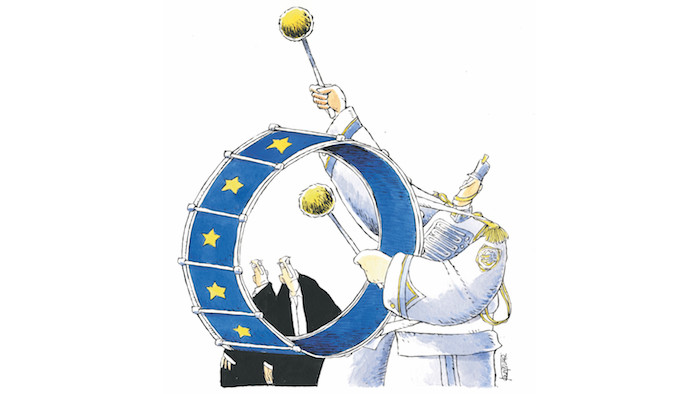In an interview published in Libération, Philippe Douroux, the author of Démocratiser l’Europe (éd. du Seuil, 2014) highlights the impossibility of a democratic debate on the EU's economic orientation.
Yet, he observes, "the initial European project, that of the Rome agreement of 1957, was also a political project and not simply a collection of shared rules to unify an economic and monetary space."
Today, by contrast, the only true European government is the common market and the eurozone, which are governed by three so-called "independent" institutions: the European Court of Justice (EUCJ), Commission (EC) and Central Bank (ECB). All three are made up of non-elected officials – although admittedly the European commissioners are approved by the Parliament – and, paradoxically, they "have created Europe's political space, but are always eager to steer clear of partisan ideologies and diplomatic strategies viewed as serving national self-interest."
Antoine Vauchez criticises —
a fundamental bias in the EU: whenever the desire is expressed to work towards a European 'general interest', it is placed in the hands of an independent institution far removed from the political sphere. And the euro crisis has only reinforced this tendency. In Europe's "econo-politics", members of parliament, whether European or national, have only a secondary role. Since they do not have the power to create European laws, they cannot rebalance national economies. Instead they are simply carried by the current that leads to their ever closer union.
And even when eurozone finance ministers, heads of state and government leaders intervene, as during the recent Greek debt crisis, "the very structure of these negotiations between states gives an advantage to players like the German Finance Minister, Wolfgang Schäuble, who defend the reinforcement of the rules of this supranational economic constitution, which have been built up by 'independent bodies' over the years," Vauchez argues.
As for the European Parliament, it should have taken on its full role in Europe's democratic debate after the European elections in 2014. Instead, Vauchez believes, it has "lost much during the crisis", because "it has no representative in the Troika [ECB, IMF and European Commission]. An MEP has yet to be involved in establishing austerity measures, in particular for Greece."
The call by Greek Prime Minister Alexis Tsipras for a referendum on the aid package proposed by the Eurogroup is "a way of responding to the impossibility of creating a transnational political debate about EU policy. That is why," the French academic argues, "we are stuck with fairly harsh economic rules, with this relationship between creditors and debtors, between north and south." The very fact that certain critics have labelled the referendum a "negation of democracy" "shows to what extent voting is not a way of reaching political compromises in Brussels."
And if no European political figure has emerged from this backdrop, it is because "the rules determined by the Commission of by the ECB stifle any political enthusiasm. […] When politicians enter onto the European stage, it is as if they sent down the single track that is the European project, which leads them to abandon their prerogatives to institutions outside the political arena." Forms of resistance to this tendency exist, Vauchez believes, in Karlsruhe's Federal Constitutional Court, in Spain's Podemos or Greece's Syriza. But the problem is "that these political expressions are relegated to a form of illegitimacy because they are not 'European', as if what is legitimate in national democracies disappears at the European level."
To correct this gap, Vauchez proposes that the ECB and the Commission make their debates public, organising what he calls "public expression of the disagreements and discussions that run through them." The inclusion of third parties, such as political parties, NGO representatives and trade unions, in the ECB's board meetings would secure a link to society at large.
Yet the tools to ensure politics trumps economics already exist, Vauchez claims, reminding readers that "the Lisbon treaty allows European parliaments to unite in opposition to an initiative from the Commission," a move that —
was used in 2012 against the Monti-2 project to limit the right to strike. A common front organised by national parliaments put a halt to the initiative, proof that they can face up to the Commission. Yet national political parties need to recognise the responsibility that now falls on them to bring about this transnational, European politics!
Do you like our work?
Help multilingual European journalism to thrive, without ads or paywalls. Your one-off or regular support will keep our newsroom independent. Thank you!












